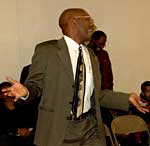By Brandt Williams
Minnesota Public Radio
January 21, 2002
|
| RealAudio |
Despite the availability of a variety of social programs, many African American men in Hennepin County aren't doing well. A recent report by the county shows that nearly half of all black men age 18 to 30 are arrested each year. It also reveals that black men are twice as likely to die before their 24th birthday than their white counterparts. The report provides recommendations as to how the county can help solve some of the problems facing African-American males. The authors of the report say black men themselves should be a part of the solution.
| |
|
|
|
||
"Remember that ol' thing about, if you aren't a part of the solution, you're part of the problem?"
John Turnipseed tells a group of about 50 black men that they share responsibility for the plight that has befallen many African-Americans.
"So when we let these young brothers come out of jail and stumble and bumble all over themselves, and go back to crack cocaine, we're accessories to manslaughter. We're accessories to child abuse," Turnipseed says.
Turnipseed is part of a group called Brother Achievement, which on this night is meeting at Sabathani Community Center in Minneapolis. The group seeks to get more black men involved in grass roots organizations that try to remedy problems in the African-American community.
Tonight's meeting is being held on Martin Luther King Jr.'s birthday, and the men are sharing how Dr. King has inspired them.
"This right here I think is one of his visions, to see men standing up in the community," said one participant.
The men say that America's legacy of slavery and racism has greatly contributed to poor education, housing, health care and employment for African-Americans. However, the recurring theme of the meeting is, "What can you do?" to be a part of the solution.
Most of the men appear to be over 30. They say as a whole, black men in their age group have been absent from their place as positive role models for younger African-Americans.
This belief is also shared by the authors of the report released by Hennepin County's African-American Men's Project. The project is just one of 30 to 40 initiatives in the County's office of Planning and Development.
Gary Cunningham, the director of the department, is an African-American. Cunningham says one of the report's recommendations is to create a group of black men who can mentor younger African-Americans.
"What we need to be able to do is build a critical mass of successful African-American men. The primary goal of the African-American Men's Commission is to create this critical mass - so it becomes cool to get a job. It becomes cool to take care of your family," Cunningham says.
To reach those goals involves an uphill climb.
| |
|
|
|
||
The report found that nearly half of the 11,000 black men aged 18 to 30 living in Hennepin County, live in the poorest and most unsafe neighborhoods of Minneapolis.
Nearly half are raised by a single mother. Nearly three-quarters do not graduate high school in four years, and nearly half do not graduate high school at all.
Cunningham says the situation is urgent, because the population of young black males is expected to increase by 70 percent in the next 15 to 20 years.
However, he says this report is not a call for more money or programs. Cunningham says the findings of the report will help the county be more accountable to the people it serves.
"I don't know how in the world we have the amount of social service dollars going into these communities and we don't see any transformation," Cunningham says. "It's clear that some programs are doing well, and we need to encourage those programs to do more. But there are programs out here that aren't doing well."
The Brother Achievement meeting ends and most of the men remain to shake hands, hug and reflect on the messages shared earlier in the evening. Many express hope that they can make a difference for their communities. However, they know a large part of the task is to instill that hope in others.
Wali Osborne, 24, says many young men his age don't have a sense of hope because they don't see how things can change. Osborne says change starts with the individual.
"My life philosophy is you must be the change you want to see in the world. I know that sounds idealistic. A lot of people don't have hope. So it really is hard to convince people of that," Osborne says.
The Hennepin County Board will discuss the recommendations later this week, and will vote on them in February.
More from MPR

